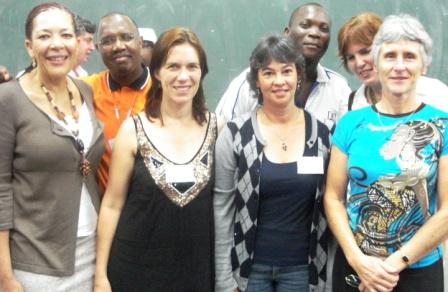
Academics from around the country were at Rhodes last week to discuss the proposals as outlined in the Academy of Science of South Africa’s report entitled “The PhD Study: an evidence-based study on how to meet the demands for high-level skills in an emerging economy”.
Released in October last year, the report is the first of its kind to address PhD training in South Africa and identifies the barriers and opportunities for effective training and high-level outputs at the doctoral level. It lists 10 recommendations for growing the number of PhDs in South Africa.
Panel members Professor Jenni Case of the University of Cape Town, Professor Cecilia Jacobs of the Cape Peninsula University of Technology, Dr Clever Ndebele of the University of Venda, Dr Carol Thomson of the University of KwaZulu-Natal and Dr Emmanuel Magqwashu, also of UKZN, presented the recommendations and contextualised them in light of what they would mean for the world of academia and those involved. “It’s great to have useful questions on the table but the recommendations themselves open up a number of questions. It’s crucial that we look at these issues in depth,” said Prof Case, who addressed recommendations one and two.
Recommendation one includes escalating the numbers of doctoral graduates through external intervention programmes, while recommendation two involves expanding significantly the levels of funding for doctoral studies in South Africa, with a particular focus on shifting the balance of students towards full-time study. “In a way I do support recommendation one but I’m concerned about where the budget would come from. Students generally find funding for external postgraduate study, so this is unclear for me. With regards to recommendation two of increasing funding to allow for full-time PhD study, I agree with this,” said Prof Case.
Prof Jacobs addressed recommendations three and four, which include creating an overarching and interconnected national planning strategy for dealing with high-level skills production, such as the doctorate, so that all parts of the system work in the same direction; and addressing the pipeline issues as a matter of urgency, for in the long term it will not be possible to sustain high levels of doctoral entrants into advanced training without a sharp increase in the numbers of students coming into undergraduate education, early postgraduate education, and eventually into PhD programmes. “With regards to recommendation three, there’s a problem with the implementation of the notion of the overarching and interconnected national planning strategy. We have seen the lack of coherence of government sectors, and I just can’t see how this would suddenly come together,” she said.
Dr Magqwashu highlighted recommendations five and six, which include eliminating the multiple barriers – bureaucratic, administrative, political, legal and structural – that stand in the way of increasing the pool of doctoral candidates in the system and the pool of competent supervisors for doctoral students ; and applying strong quality assurance measures to the doctorate, on one hand to prevent irresponsible massification of the degree in the light of the substantial funding incentives for graduating PhDs, and, on the other hand, to deepen the quality of the qualification across universities.
Dr Ndebele addressed recommendations seven and eight, which include advocating public support for, and understanding about, the PhD so that there is greater awareness and acceptance of its significance in social and economic development, beyond personal gains for the successful student; and targeting specific institutions with existing capacity and established track records for scaling up the production of PhDs even as selected programmes are funded within universities that are not strong overall in producing doctorates.
The final two recommendations, as highlighted by Dr Thomson, include recognising and rewarding the diversity of doctoral programmes in practice, and adapting national policy to these realities rather than impose a one-size-fits-all model of the traditional; and strengthening and elaborating the relationship between universities and industry, as well as science councils, so that larger numbers of doctoral students are trained and supported through learning in practice while at the same time supplementing academic advisorships on campus with those working in the field. “I worry about recommendation nine because as I see it the PhD is already something of a commodity. With increased advertising and hype what will it become? We also have to question the relevance of the PhDs themselves. How many students that go out into the world actually fulfil the expectations and needs of the employer?” she said.
Rhodes University Vice-Chancellor Dr Saleem Badat described the report as “very strange” and full of “tepid, insipid proposals”. “The more I read it the more annoyed and angry I become. It is simplistic and only telling us what we already know. Why does PhD research have to contribute directly to certain industries in order for it to be valuable? To my mind it is the process and skills acquired through the study of a PhD that should be valued. I don’t find a lot of these proposals very useful. They simply undermine our own value,” he said.
Photograph(from left to right): Prof Jean Baxen of Rhodes University’s Education Department, Dr Clever Ndebele of the University of Venda, Prof Jenni Case of UCT, Prof Cecilia Jacobs of CPUT, Dr Emmanuel Magqwashu of UKZN, Prof Sioux McKenna, Doctoral coordinator at Rhodes University’s Centre for Higher Education and Research and Dr Carol Thomson, also of UKZN.
Photo by Sarah-Jane Bradfield.
